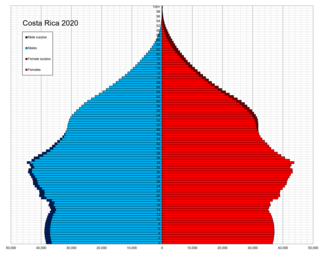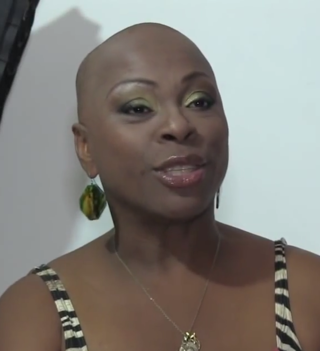
This is a demographic article about Costa Rica's population, including population density, ethnicity, education level, health of the populace, economic status, religious affiliations, and other aspects of the population.

Lesbian, gay, bisexual, and transgender (LGBT) rights in Costa Rica have evolved significantly in the past decades. Same-sex sexual relations have been legal since 1971. In January 2018, the Inter-American Court of Human Rights made mandatory the approbation of same-sex marriage, adoption for same-sex couples and the removal of people's sex from all Costa Rican ID cards issued since October 2018. The Costa Rican Government announced that it would apply the rulings in the following months. In August 2018, the Costa Rican Supreme Court ruled against the country's same-sex marriage ban, and gave the Legislative Assembly 18 months to reform the law accordingly, otherwise the ban would be abolished automatically. Same-sex marriage became legal on 26 May 2020.

Asociación Deportiva Carmelita is a Costa Rican football team playing in the Segunda División. The team is based in Barrio El Carmen, Alajuela, Costa Rica and their home stadium is Rafael Bolaños Stadium in El Coyol, Alajuela
Enrique Alberto Díaz Harvey is a retired Costa Rican footballer. He is considered one of the best Costa Rican wingers of the 1980s, and one of the most recognized sports figures in his country.
Same-sex marriage has been legal in Costa Rica since May 26, 2020 as a result of a ruling by the Supreme Court of Justice. Costa Rica was the first country in Central America to recognize and perform same-sex marriages, the third in North America after Canada and the United States, and the 28th to do so worldwide.

Football is the most popular sport in Costa Rica. Costa Rica has long been considered an exporter of footballers within Central America, with 19 players in European professional football leagues during 2006. The newspaper, La Nación, has prepared an annual census of these "Legionnaires" since 1994.

Epsy Alejandra Campbell Barr is a Costa Rican politician and economist who served as the Vice-president of Costa Rica from 8 May 2018 to 8 May 2022. She is the first woman of African descent to be vice president in Costa Rica and in Latin America.
Leonidas Flores Reyes is a Costa Rican former professional footballer who played as a forward.
The Primera División of Costa Rica, commonly known as Liga de Fútbol de Primera División, and Liga Promerica for sponsorship reasons, is the top professional association football division in Costa Rica. It is administered by the Unión de Clubes de Fútbol de la Primera División (UNAFUT). The league consists of 12 teams, with the last-placed team relegated to the Liga de Ascenso.

Deportivo Saprissa is a Costa Rican sports club, mostly known for its football team. The club is based in San Juan de Tibás, San José, and play their home games at the Estadio Ricardo Saprissa Aymá. Their colours are burgundy and white. It is the main team representing the capital, but with the distinction of being massively followed throughout the whole country and overseas. The club was founded in 1935 and has competed in the Costa Rican first division since 1949. The name of the team comes from one of the club's main founders, Ricardo Saprissa Aymá. One of the most popular nicknames for the team El Monstruo Morado can be traced back to 1987, when the Costa Rican newspaper Diario Extra gave the team the nickname during a derby, because of the club's enormous following. A reporter commented that the sea of fans in the stands at the Estadio Ricardo Saprissa Aymá in Tibás wearing purple, and the tremendous noise they were generating, made him feel like he was "in the presence of a thousand headed monster". Saprissa immediately adopted the nickname El Monstruo Morado. It remains the most lauded football team in the whole region.
Barrio México Fútbol Club is a Costa Rica football club, which currently plays in the Costa Rican second division.

Asociación Deportiva Guanacasteca is a Costa Rican football team based in Nicoya, Guanacaste. They currently play in the Costa Rican First Division. Their home stadium is Estadio Chorotega.
Alfredo Piedra Mora was a Costa Rican footballer and manager.
Juan José Gámez Rivera was a Costa Rican football player and manager.
Álvaro Grant MacDonald is a Costa Rican former football player and manager.
Leonel Hernández Valerín is a retired Costa Rican football player.
Palmira N. Ríos is an Afro-Puerto Rican academic who has worked as a professor in New York, the Dominican Republic and Puerto Rico. She has served as a commissioner and president of the Puerto Rican Civil Rights Commission, the first person of color or woman to be appointed to the government body. After serving as the dean of the Graduate School of Public Administration for the University of Puerto Rico, she became the Dean of Academic Affairs for the Río Piedras Campus in 2015. The Bar Association of Puerto Rico honored Ríos with the Martin Luther King Jr.-Arturo Alfonso Schomburg Medal for her efforts to promote racial equality.

Esther Pineda G., often published as Esther Pineda, is a Venezuelan sociologist and feminist writer. She has written sociological studies, essay collections, and poetic anthologies about misogyny in the history of Western philosophy, the connection between machismo and violence against women, and racial discrimination, particularly against Afro-Venezuelans. Pineda holds a PhD in sociology, and her writing frequently uses tools of sociological analysis.

Thelma Darkings Bucknam is a Costa Rican actress and television presenter. She is known for hosting the Costa Rican talk show programs Conectados and previously Entre nos. Her film credits include Noi siamo angeli (1997), Caribe (2004), and El último comandante (2010).
The Global Coalition Against Systemic Racism and for Reparations is an international platform whose purpose is to promote actions that confront and eliminate systemic racism and advocate for reparations through collaboration among public, private, political, social, business, cultural, and productive entities, as well as international organizations.











